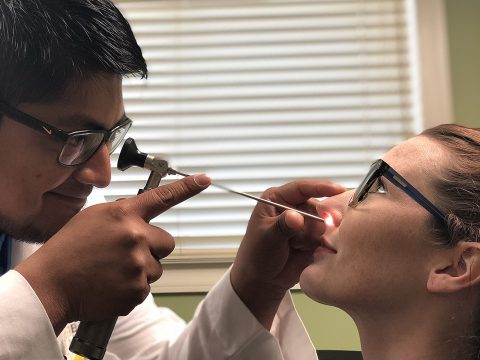- 979-485-9287
- office@bvallergy.com
-
 979-251-7804
979-251-7804
Understanding Chronic Sinusitis: Causes, Symptoms, and Diagnosis

Allergy Drops and Asthma: Managing Allergic Triggers
September 25, 2023
Your Guide to Selecting the Best Texas Allergy Specialist
October 19, 2023Chronic sinusitis is one of the most common health issues globally, affecting 28.9 million people, according to the National Center for Health Statistics. Living with sinusitis is very challenging, especially for the undiagnosed. That’s why it’s crucial to understand the root causes, recognize the symptoms, and obtain an accurate diagnosis to take proactive steps toward effective management.
Here’s everything you need to know about chronic sinusitis to help you breathe easier and live a healthier, stress-free lifestyle!
What is Chronic Sinusitis?
Chronic sinusitis occurs when the sinuses get swollen and inflamed for an extended period, typically lasting more than 12 weeks. Symptoms include congestion, facial pain or pressure, trouble breathing, and a reduced sense of smell or taste.
What Causes Chronic Sinus Infection?
The most common contributors to chronic sinusitis are allergies. When your body comes into contact with an allergen, such as pollen or dust, it can trigger an immune response, leading to nasal inflammation.
This inflammation may persist for an extended period of time, leading to chronic sinusitis. Another factor that may contribute to this condition is a structural abnormality in the sinuses. Certain lifestyle factors cause or aggravate chronic sinusitis. For example, smoking can irritate the sinuses and lead to inflammation, while exposure to environmental pollutants may exacerbate sinus problems.
The most common causes include:
Allergies and Sensitivities
Chronic sinusitis often originates from allergies and sensitivities. When the nasal passages react to allergens, they become inflamed, leading to persistent sinus issues. Common triggers include pollen, dust mites, and pet dander.
Nasal Polyps
These noncancerous growths in the nasal passages obstruct normal drainage and airflow, contributing to chronic sinusitis. While small nasal polyps may go unnoticed, larger ones can lead to significant discomfort and sinus blockage.
Deviated Septum
A deviated septum (crooked nasal septum) can impede proper drainage, resulting in chronic sinusitis. It may be a congenital issue or the result of trauma.
Respiratory Infections
Respiratory infections, like colds and the flu, often lead to chronic congestion if not adequately managed. The lingering inflammation can persist long after the initial infection has cleared.
Environmental Factors
Exposure to pollutants, smoke, and other environmental irritants exacerbates sinusitis. Prolonged contact with such elements usually leads to chronic nasal congestion of the sinus passages.
Sensing the Symptoms of Sinusitis
Diagnosing chronic sinusitis is usually tricky because its symptoms are similar to other conditions. However, some common signs indicate chronic sinusitis, especially if they recur and last more than 12 weeks.
The typical sinusitis symptoms include:
Prolonged Congestion
One of the hallmark signs of chronic sinusitis is persistent nasal congestion. This condition often leads to difficulty breathing through the nose, particularly at night.
Facial Pressure and Pain
Individuals with chronic sinusitis frequently experience discomfort in the facial region, including the forehead, cheeks, and around the eyes. This sensation is due to the increased pressure within the sinus cavities.
Thick Nasal Discharge
Unlike acute sinusitis, which often presents with clear mucus, you can identify chronic sinusitis by thick, discolored nasal discharge. This condition indicates a prolonged inflammatory process.
Reduced Sense of Smell
Chronic sinusitis can lead to a diminished sense of smell, as the inflammation affects the olfactory receptors in the nasal passages.
Coughing, Especially at Night
Postnasal drip, a common symptom of chronic sinusitis, can lead to persistent coughing, mainly when lying down.
Navigating the Diagnostic Process
The diagnostic process of chronic sinusitis is often complicated, as the symptoms often overlap with those of other conditions. It makes the exact cause of the issue nearly unidentifiable. However, there are several steps you can take to help identify the root of the problem.
Physical Examination
Your healthcare provider typically starts with a thorough physical examination to diagnose chronic sinusitis. This method may include a visual inspection of the nasal passages.
Endoscopy
In cases where a visual inspection is insufficient, an endoscopy is ideal. This procedure involves a tiny camera inserted into the nasal passages to provide a detailed view of the sinus cavities.
Imaging Studies
CT scans or MRI imaging can help your doctors get a comprehensive view of the sinus cavities. This approach helps in identifying any structural abnormalities or blockages.
Allergy Testing
If you suspect allergies as contributing factors, allergy testing is ideal to pinpoint specific triggers.
Culture and Sensitivity Tests
In recurrent infections, a culture and sensitivity test is ideal for identifying the specific bacteria responsible and determining the most effective treatment.
Frequently Asked Questions
Can chronic sinusitis be cured completely?
While chronic sinusitis is manageable, curing it completely may not always be possible. Treatment focuses on alleviating symptoms and preventing recurrent flare-ups.
Are there any natural remedies for chronic sinusitis?
Specific lifestyle changes like maintaining proper hydration, using saline nasal sprays, and incorporating anti-inflammatory foods can help manage chronic sinusitis.
Is surgery an ideal chronic sinusitis treatment?
In severe cases or when the preliminary treatments fail, surgery might address structural issues or remove nasal polyps.
Can chronic sinusitis lead to complications if left untreated?
Yes, untreated chronic sinusitis can lead to complications like recurrent infections, abscesses, or even the spread of disease to nearby organ structures.
Is chronic sinusitis contagious?
No, chronic sinusitis itself is not contagious. It is typically a result of internal factors like allergies or structural issues.
Can children develop chronic sinusitis?
Yes, children can develop chronic sinusitis, often due to allergies or respiratory infections.
Learning the essentials of chronic sinusitis ensures timely and effective management. You can take proactive steps toward improved sinus health by recognizing the underlying causes, identifying symptoms, and undergoing thorough diagnostic procedures.
Remember, early intervention and proper care are vital in alleviating the discomfort associated with chronic sinusitis.
Breathe Easy and Keep Your Sinuses Healthy
If you’re searching online for information on “what causes chronic sinusitis” and “chronic sinus infection,” you’re on the right track!
An accurate diagnosis is the first step towards safe and effective chronic sinusitis management. We aim to provide you with the appropriate treatment options to constantly keep your health in top condition.
Dr. Paul Jantzi and his team of board-certified allergists are happy to provide the treatment you deserve. Talk to reliable allergy experts in Brazos Valley today!
Book an appointment here!




